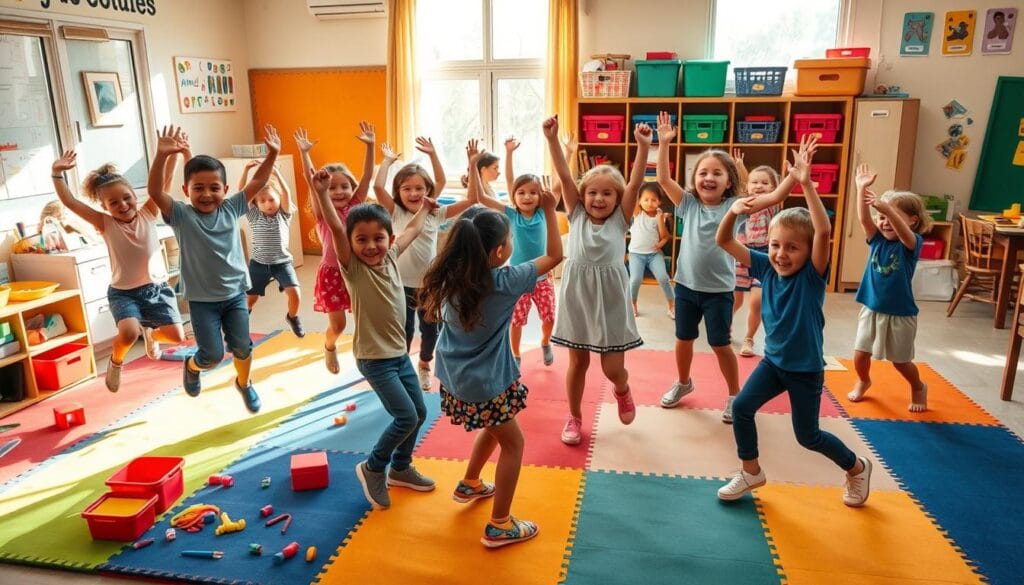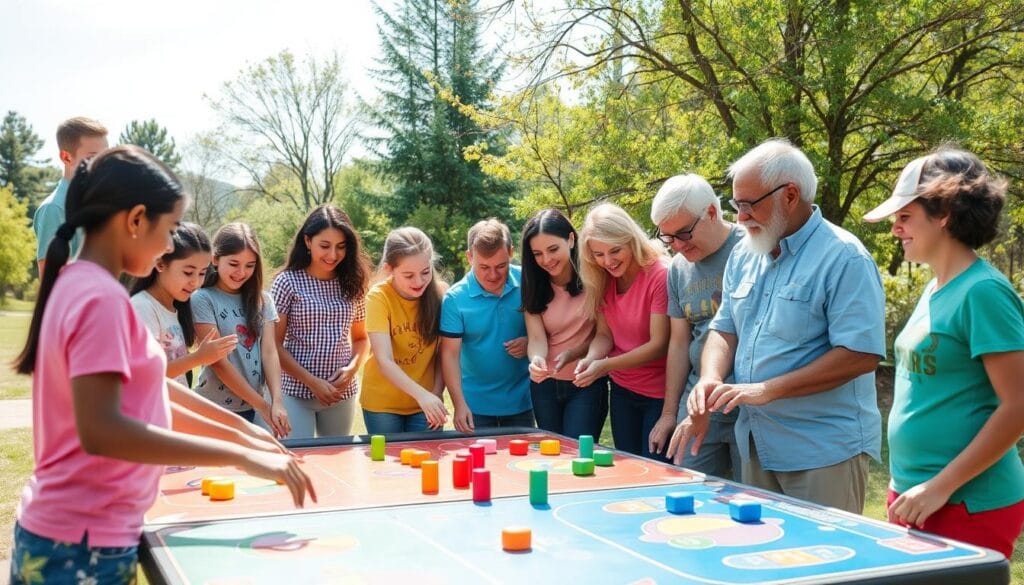Collective Games to Foster Collaboration
In today’s fast world, teamwork is key. Collective games, or “jeux collectifs” in French, help build this skill. They make teams stronger and better at solving problems together.
These games improve how well team members talk and work together. They create a sense of unity and success. Whether for work or personal growth, collective games are a great choice.
فهرس المقالة
Understanding the Power of Collaborative Gaming
Unlocking the full potential of group dynamics starts with understanding the psychology of collaborative gaming. When people play together, they experience a mix of social interactions, teamwork, and problem-solving. This mix lays the groundwork for stronger team building.
The Psychology Behind Group Play
Group play meets our need for social connection and shared experiences. Playing together helps build trust, communication, and empathy. Working towards a goal boosts group dynamics and teamwork skills, thanks to the “social bonding” hormone, oxytocin.
Benefits for Team Development
Collaborative gaming is great for team growth. Players learn to communicate effectively, compromise, and solve problems together. These skills are key for successful teams, including leadership, adaptability, and conflict resolution.
Social Learning Through Games
Games are a great way to learn from each other. Players can try new things, learn strategies, and gain from others’ experiences. Through shared gaming, people get to know each other better, creating stronger bonds and a sense of unity.
“The essence of group activity is the creation of a ‘we’ from the ‘I.'” – Kurt Lewin
Essential Elements of Effective Team Games
Creating engaging jeux collectifs (collaborative games) is all about teamwork. These games should make players work together better and enjoy it. They help build strong teams and improve how groups work together.
First, team games need clear objectives. Players must know what they’re working for. This could be solving a puzzle, beating a challenge, or just having fun together. Clear goals keep everyone focused and excited about playing together.
- Another important thing is balanced participation. Jeux collectifs should let everyone play a part. This makes everyone feel included and important.
- Games should also be designed for everyone. They should work for different skills and backgrounds. This way, everyone can join in and feel valued.
When these key elements are put together right, jeux collectifs become great for building teams. They create unforgettable experiences. Players leave with a deeper respect for teamwork.
“The most effective team games are those that bring people together, challenge them to work towards a common goal, and leave them with a sense of shared accomplishment.”
Popular Collective Games for Team Building
Jeux collectifs, or collective games, are great for building community and teamwork. They come from French traditions and help people come together. These games create a sense of shared purpose.
Traditional French Group Games
Pétanque is a classic game that encourages teamwork. Players work together towards a goal. Another favorite is la balle au prisonnier, a game that needs teamwork and talking.
These games have been loved for years. They are simple yet powerful in building community.
Modern Adaptations
New versions of jeux collectifs have come out. Games like escape rooms and scavenger hunts test teamwork and problem-solving. They create a sense of unity and achievement.
These games mix old-school collective play with new ideas.
Cultural Variations
Games that bring people together are found worldwide. Indigenous communities have circle games, while Latin America loves lively dance performances. These show the variety and beauty of collective play.
Exploring these games helps teams appreciate the joy of coming together.
| Traditional French Jeux Collectifs | Modern Adaptations | Cultural Variations |
|---|---|---|
|
|
|
“Collective games have the power to transcend cultural boundaries, bringing people together through the universal language of shared experiences and community building.”
Indoor Collaborative Games for Limited Spaces
In today’s world, space is limited, but teamwork is key. There are many indoor games that fit well in small areas. These games help groups work together and improve their teamwork skills.
Charades is a great game for small spaces. It’s all about acting out words without speaking. It’s fun and doesn’t need much room. Taboo is another good choice. It’s a game where you guess words based on hints given by your teammates.
- Escape Room-Style Challenges: Try setting up an indoor escape room. It’s a fun way to test your team’s problem-solving skills. Make sure the challenges fit the space you have.
- Cooperative Card Games: Games like Codenames and Hanabi are perfect for small groups. They help everyone work together towards a goal. You can play them in a small meeting room or even at a conference table.
- Collaborative Drawing Exercises: Get your team to draw together. It’s a fun way to practice communication and creativity. You don’t need a lot of space for this activity.
Indoor games are great for building teamwork and social skills, even in small spaces. They help your team work well together, no matter where they are.
| Game | Description | Recommended Space |
|---|---|---|
| Charades | Pantomime-based game that encourages non-verbal communication and creative problem-solving | Can be played in a small meeting room or even around a conference table |
| Taboo | Word association game that promotes quick thinking and verbal dexterity | Well-suited for small group gatherings or office breakout spaces |
| Escape Room-Style Challenges | Puzzle-solving and clue-deciphering activities that test a team’s critical thinking and collaboration | Can be designed to fit within the constraints of a small conference room or classroom |
“The best way to find out if you can trust somebody is to trust them.”
– Ernest Hemingway
Indoor games are a great way to build teamwork and social skills, even in small spaces. They help your team work well together, no matter where they are.
Outdoor Team Activities for Large Groups
Outdoor team activities are a fresh way to build teamwork and friendship among big groups. They mix team sports and physical fun with deep group dynamics and shared moments.
Field Games and Sports
Outdoor field games like soccer, flag football, and basketball are great for big groups. They also include fun games like ultimate frisbee and capture the flag. These games boost physical health, teamwork, and quick thinking, all while building team bonding.
Nature-Based Challenges
Nature challenges take teams on exciting adventures. They include orienteering, scavenger hunts, and survival skills. These activities improve group dynamics, problem-solving, and teamwork, all in nature’s beauty.
Adventure Racing Activities
Adventure racing is perfect for thrill-seekers. It combines physical and mental tests. Activities like obstacle courses, timed races, and wilderness navigation build shared experiences, teamwork, and pride.
“Outdoor team activities not only encourage physical engagement but also cultivate a deeper sense of group dynamics and shared experiences.”
Outdoor activities offer a wide range of fun for big groups. They help build teamwork, leadership, and a sense of adventure.
Digital Platforms for Virtual Team Collaboration
In today’s digital world, remote teams are more common than ever. They need good virtual collaboration tools more than ever. These tools help with multiplayer games and cooperative gameplay. They also improve social interaction and teamwork among team members who are far apart.
Platforms like Zoom, Microsoft Teams, and Google Meet have changed how teams talk and work together. They offer video calls, screen sharing, and virtual whiteboards. This makes it easy to collaborate, no matter where you are.
There are also many online multiplayer games and team-building activities. These activities help teams bond and work together better. They include puzzles and virtual escape rooms that make teams feel closer, even when they’re apart.
| Platform | Key Features | Ideal for |
|---|---|---|
| Zoom | Video conferencing, screen sharing, virtual whiteboard | Team meetings, presentations, virtual workshops |
| Microsoft Teams | Integrated communication, collaboration tools, file sharing | Project management, task organization, remote collaboration |
| Google Meet | Video calls, live captions, easy scheduling | Informal team check-ins, casual virtual gatherings |
Using these digital tools, teams can stay connected and work well together, even from a distance. As work changes, these tools will become even more important. They help teams work better and stay productive.

Designing Custom Collaborative Games
Making your own collaborative games can really help your team. You can set goals, use group dynamics, and check how well it works. This way, you can make games that really help your team work together better.
Setting Clear Objectives
The first thing to do is figure out what you want to achieve. Do you want to get better at talking, solving problems, or trusting each other more? Knowing what you want will help you make a game that meets those needs.
Incorporating Team Dynamics
Good games should match your team’s vibe. Think about how big your team is, how well you all get along, and how much you need to work together. Making your game fit these things will make it more fun and meaningful for everyone.
Measuring Success
To see if your game is working, you need to know how to measure it. Look for things like how well your team works together, if they’re solving problems better, or if they’re more involved. By watching these things, you can make your game even better.
| Collaborative Game Design Considerations | Example |
|---|---|
| Clearly defined objectives | Improving communication within a cross-functional team |
| Incorporation of group dynamics | Designing a game that encourages equal participation from introverted and extroverted team members |
| Measurable success criteria | Tracking increases in the number of team members actively contributing ideas during meetings |
“The best collaborative games are those that are tailored to the specific needs and dynamics of the team. By designing custom experiences, you can create truly engaging and impactful team-building activities.”
Facilitating Successful Group Gaming Sessions

To build teamwork skills, social interaction, and community building through gaming, you need to plan well. As the leader, your job is to make the gaming experience great for team-building. Here are some tips to help you:
Preparation is Key
Learn the rules and goals of the games you’ll play. Think about any problems that might come up and have plans to solve them. Make sure you have all the equipment and space you need for a smooth session.
Engage Participants Actively
Join in the games and show good teamwork skills and social interaction. Encourage teamwork, talking, and helping each other. Give tips and feedback to help the team overcome game challenges.
Facilitate Meaningful Debriefing
After playing, lead a deep discussion. Ask players to think about what they learned and how it can help in community building. This part is key to making sure everyone gets the most out of the gaming session.
| Facilitation Aspect | Best Practices |
|---|---|
| Preparation |
|
| Engagement |
|
| Debriefing |
|
By using these tips, your gaming sessions will be fun and help build teamwork skills, social interaction, and community building among everyone.
Adapting Games for Different Age Groups
Creating jeux collectifs (collaborative games) for various age groups is key. It’s about making games that fit the needs and interests of each group. Whether it’s fun games for kids or team-building for adults, the right game can make a big difference.
Children’s Collaborative Games
Games for kids should be fun, spark imagination, and help with social skills. Look for games that promote talking, solving problems, and working together. Some great examples include:
- Cooperative board games
- Scavenger hunts with group tasks
- Creative building challenges
Adult Team Building Activities
Games for adults should be fun but also help with professional skills. Choose activities that help with leadership, solving conflicts, and thinking strategically. Some good options are:
- Escape room challenges
- Outdoor adventure races
- Business-themed simulation games
Multi-generational Options
Games that appeal to all ages are perfect for bringing people together. Think about classic party games, interactive stories, or games that mix physical and mental challenges. The goal is to find games that boost group dynamics and shared experiences for everyone.
By tailoring games to different age groups, you can make experiences that are fun and meaningful. These games help with jeux collectifs, improve teamwork, and build understanding among all participants.

Conclusion
Jeux collectifs, or collaborative games, are powerful tools for teamwork. They improve collaboration and build strong communities. These games work in many settings and for all ages.
Playing together boosts communication, problem-solving, and trust. Adding these games to your team-building can help your team grow. It strengthens their relationships and skills.
The future of collaborative gaming looks bright. New tech will make these games more accessible. We’ll see more cultural games, making them fun for everyone.
FAQ
What are collective games (jeux collectifs) and how do they foster collaboration?
Collective games, or jeux collectifs, are activities that bring people together. They promote teamwork, social interaction, and improve communication. Players work as a team to achieve a goal, strengthening bonds and enhancing group dynamics.
What are the psychological benefits of group play?
Playing in groups can deeply impact team psychology. It boosts social interaction, communication, and community feeling. Players learn from each other, leading to better problem-solving and decision-making.
What are the key elements of effective team games?
Good team games have clear goals, fair participation, and inclusive design. These elements help everyone feel involved and valued, leading to success in teamwork.
What are some popular jeux collectifs used for team building?
Popular games include Pétanque and Boules from France, and Sumo wrestling from Japan. These games help build teamwork and community, both old and new.
How can teams collaborate virtually through digital platforms?
Online platforms and multiplayer games make virtual teamwork possible. They help teams stay connected and work together, even when apart.
How can you design custom collaborative games for your team?
Designing games for your team means setting clear goals and understanding team dynamics. Tailoring the game to your team’s needs can make it more effective and meaningful.
What are some best practices for facilitating successful group gaming sessions?
Good facilitation includes preparation, engaging techniques, and debriefing. The facilitator’s role is key in making games effective for team-building, encouraging participation and open communication.
How can you adapt collective games for different age groups?
Adapting games for different ages means considering each group’s needs. From kids to adults, and even mixing ages, games can be tailored to fit various settings and needs.






